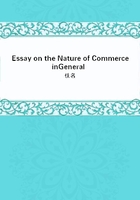
第30章
But if the landlords stipulate with their farmers for half yearly instead of yearly payments, and if the debtors of the two other rents also make their payments every six months, this will alter the rapidity of circulation: and whereas 10,000 ounces were needed to make the annual payments, only 5000 will now be required, since 5000 ounces paid twice over will have the same effect as 10,000 ounces paid once.
Further if the landlords stipulate with their farmers for quarterly payments, or if they are satisfied to receive their rents from the farmers according as the four seasons of the year enable them to sell their produce, and if all other payments are made quarterly, only 2500 ounces will be needed for the same circulation which would have been conducted by 10,000 ounces paid once a year. Therefore, supposing all payments made quarterly in the little state in question, the proportion of the value of the money needed for the circulation is to the annual produce of the soil (or the three rents), as 2500 livres is to 15,000 livres, or as 1 to 6, so that the money would correspond to the sixth part of the annual produce.
But seeing that each branch of the circulation in the cities is carried out by undertakers, that the consumption of food is met by daily, weekly or monthly payments, and that payment for the clothing purchased once or twice a year by families is made at different times by different people; and whereas the expenditure on drink is usually made daily, that on small beer, coal, and a thousand other articles of consumption is very prompt, it would seem that the proportion we have established for quarterly payments would be too high and that the circulation of a land produce of 15,000 ounces of silver in value could be conducted with much less than 2500 ounces of silver in ready money.
As however the farmers have to make large payments to the landlords at least every quarter and the taxes which the prince or the state collects upon consumption are accumulated by the collectors to make large payments to the Receivers-General, there must be enough ready cash in circulation to make these large payments without difficulty, without hindering the circulation of currency for the food and clothing of the people.
It will be seen from this that the proportion of the amount of money needed for circulation in a state is not incomprehensible, and that this amount may be greater or less in a state according to the mode of living and the rapidity of payments. But it is very difficult to lay down anything definite as regards this quantity in general, as the proportion may differ in different countries, and it is only conjectural when I say that "the real cash or money necessary to carry on the circulation and exchange in a state is about equal in value to one third of all the annual rents of the proprietors of the said state."
Supposing the money in circulation equal to the third of all the rents of the landowners and these rents equal to the third of the annual produce of the land, it follows that "the money circulating in a state is equal in value to the ninth part of all the annual produce of the soil."
Sir William Petty, in a manuscript of 1685, supposes frequently that the money in circulation is equal to one tenth of the produce of the soil. He gives no reason. I suppose it is an opinion which he formed from experience and from his practical knowledge both of the money circulating in Ireland (a great part of the land of which country he had measured as a surveyor) and of the produce which he estimated roughly from observation. I am not far removed from his conclusion to the landlords' rents which are ordinarily paid in money and easily ascertainable by a uniform land tax, rather than to the products of the soil, the prices of which vary daily in the markets, and a large part of which is consumed without entering into the market. In the next chapter I shall give several reasons, supported by examples, to confirm my conclusion. I think it useful, even if not mathematically exact in each country. It is enough if it is near the truth and if it prevents the governors of states from forming extravagant ideas of the amount of money in circulation. There is no branch of knowledge in which one is more subject to error than statistics when they are left to imagination, and none more demonstrable when they are based upon detailed facts.